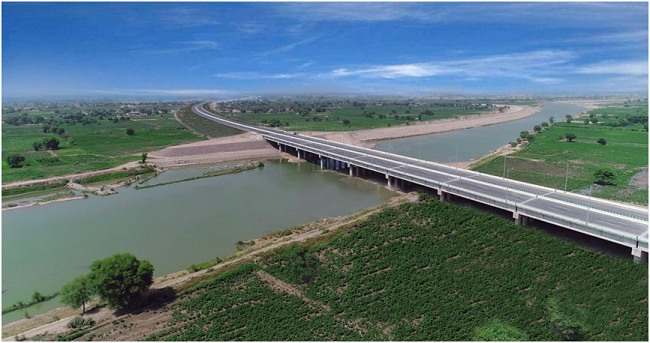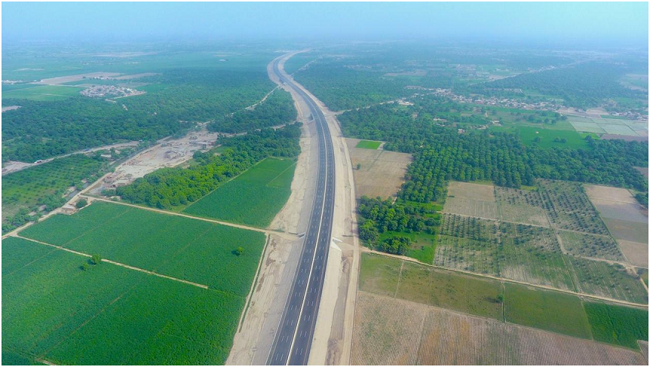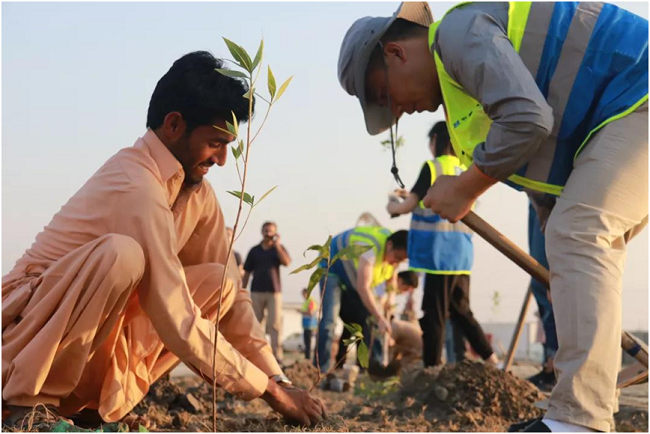PKM Project facilitates China-Pakistan Economic Corridor
China State Construction Engineering Corporation Limited (CSCEC) is one of the largest construction and investment groups in the world.
It has been more than 30 years since CSCEC entered the Pakistani market in 1984. It has successively undertaken the construction of the Jinnah Sports Stadium in Islamabad, and built five thermal power plants in Pakistan, namely, Jamshoro, Muzaffarabad, Faisalabad, Lakla and Kotri, with a total installed capacity of 2 million KW. In the mid-1990s, it completed several landmark projects such as the Karachi Sewage Treatment Plant. Since 2000, the company has achieved further success in the Pakistani market by undertaking some other landmark projects, such as the JF-17 Aircraft Manufacturing Factory, the Centaurus Multi Development Building Complex, the Lahore Arfa Karim Software Technology Park, the Thai Embassy in Pakistan, and the Islamabad International Airport Terminal Building. In December 2015, the company was awarded the contract for the PKM project (Sukkur-Multan Section), the largest transportation infrastructure project under the China-Pakistan Economic Corridor.
Islamabad International Airport constructed by the CSCEC, officially opened to air traffic on 1st May, 2018, and has performed well. The PKM project (Sukkur-Multan Section) connecting Sukkur to Multan was also officially taken over and opened to traffic on 16th December 2020. These key projects and livelihood projects have received great attention and support from both the Chinese and Pakistani governments and the public. Their quality has also been widely recognized by the local government, the employer and all sectors of society.
Over the past 30-odd years of cooperation with Pakistan, the CSCEC has always been committed to leveraging its own advantages to improve the condition of the country’s infrastructure, drive the economic development of the surrounding areas, and promote the livelihoods of locals. With the continuous and in-depth advancement of the China-Pakistan Economic Corridor, the CSCEC stands ready to continue to work together with Pakistan, deepen investment and cooperation, and contribute more to the prosperity and development of Pakistan.

The Sutlej River Bridge of the Motorway

The Mainline of the Motorway
The PKM Project (Sukkur-Multan Section)
Abbreviated to the PKM project, the Peshawar-Karachi Motorway starts from Karachi, the largest city in the south, passes through Hyderabad, Sukkur, Multan, Faisalabad, Lahore, and Islamabad, and ends in Peshawar in the north, with a total length of 1,152 kilometers.
The CSCEC undertook and implemented the Sukkur-Multan Section of the PKM project (hereinafter referred to as “the project”) under the EPC Contract mode. With a total length of 392 kilometers, a design speed of 120 km/h, 6 lanes in both directions, and a contractual construction period of 36 months, it is the first motorway equipped with an intelligent transportation system in Pakistan. Attaching great importance to this project, the Chinese and Pakistani governments listed it as an “early harvest project” under the China-Pakistan Economic Corridor.
Officially commencing on 5th August, 2016, the project was completed two weeks ahead of schedule, and Substantial Completion Certificate (SCC) thereof was issued on 22nd July, 2019. On 5th November, 2019, its inauguration ceremony was held during 9th Joint Cooperation Committee (JCC) Meeting of the CPEC and put into use. The project has won the China Construction Engineering Luban Prize (Overseas), the National Quality Engineering Gold Award and the Tien-yow Jeme Civil Engineering Prize. Since its completion, it has become a model under the China-Pakistan Economic Corridor to buck the trend during the Covid-19 epidemic, which has further injected confidence into the construction of the China-Pakistan Economic Corridor.

Plantation of Trees and Grasses
Social Responsibility
During the construction period, the company gave preference to employing local people. Except for a small number of Chinese staff, 97% were Pakistani employees, thus creating a large number of job opportunities for locals and helping the government solve employment issues to maximum extent. During the peak construction period, more than 28,900 management personnel, equipment operators and local workers were directly hired. The proportion of Chinese and Pakistani employees reached 1:32. There was also a large number of indirect employment opportunities beyond calculation.
With emphasis laid on the protection of the local ecological environment, the project has implemented greening along the whole alignment, creating a 392-kilometer green ecological corridor. A total of 335,800 trees were planted along the project. The greening area on both sides of the motorway is equivalent to 775 football fields, and the greening area of other locations and service areas is equivalent to 81 football fields. The saline-alkali lands that were previously dry and barren are now full of vitality. A green motorway with “vehicles moving in the painting and people travelling in the scenery” has been created.
The project also invited professional training institutions to carry out extensive training sessions on management skills and engineering technologies in combination with construction practices, thereby cultivating a numerous management personnel and engineering technicians for Pakistan, including nearly 1,000 engineering management personnel, over 2,000 mechanical operators, and many other professional and technical personnel in experiments, maintenance, and logistics. A large number of farmers who used to depend on farm-land have become skilled workers and operators, and are devoted to the modernization of Pakistan. The project also sent a group of Pakistani students from local areas to study in China, and subsidized all their expenses during their time in China. A large number of Pakistani trainee engineers were also recruited to participate in the project construction process and gained experience rapidly.
Affected by the monsoon climate, Pakistan suffered the most severe flood of the century in 2022. Upon learning about this situation, the project acted quickly by purchasing a large amount of urgently needed living necessities such as rice, grain, oil and sugar, and distributing these supplies for free to 800 impoverished victims nearby. As a result, the food shortage of these victims was solved, and the urgent needs of the local people alleviated. Moreover, the project purchased about 500 boxes of different medicines for post-disaster epidemic prevention, organized medical teams to visit nearby villages for free medical consultations, and carried out free medicine delivery activities. A disaster relief team of 25 people was also dispatched, carrying large machinery and equipment to help repair roads and discharge flood water in nearby villages. In addition, the CSCEC donated 600,000 rupees to the Flood Relief Fund of Pakistan through the All-Pakistan Chinese Enterprises Association, and donated disaster relief supplies worth 10 million rupees through the Pakistan National Highway Authority to support the local government in flood relief. The rescue actions of the project have attracted widespread attention at home and abroad, and have been widely reported by more than 40 overseas media outlets, including Xinhua News Agency, People.cn, CCTV, Pakistan Today, Pakistan Observer, and the Daily Times. The rescue activities have also gained the support and recognition of the local people.








